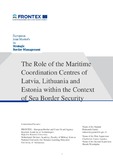| dc.contributor.author | Garais, Raimonds | |
| dc.contributor.other | de Castro Sanchez, Claribel, First Supervisor | |
| dc.contributor.other | Warnhjelm, Henrik, Second Supervisor | |
| dc.contributor.other | FRONTEX – European Border and Coast Guard Agency | |
| dc.date.accessioned | 2020-04-17T09:20:13Z | |
| dc.date.available | 2020-04-17T09:20:13Z | |
| dc.date.issued | 2019 | |
| dc.identifier.uri | https://digiriiul.sisekaitse.ee123456789/2464 | |
| dc.description | 1. Introduction ; 1.1. Research aim ; 1.2. Research questions ; 1.3. Research relevance ; 2. Literature review ; 2.1. Obligations ; 2.2. Cooperation ; 2.2.1. On the concept of cooperation ; 2.2.2. Cooperation for Border Guarding ; 2.2.3. Cooperation in the Baltic Region ; 2.3. Requirements for the Maritime Coordination Centres ; 3. Research methodology ; 3.1. Research design ; 3.2. Data collection and use of data ; 3.3. Data analysis ; 3.4. Sample strategy ; 3.5. Research quality indicators ; 3.6. Ethical considerations ; 4. Findings and results ; 4.1. National requirements and observations in the Maritime Coordination Centres ; 4.1.1. Observations in the Maritime Operation Coordination Centre of Ventspils Board of State Border Guard of Republic of Latvia ; 4.1.2. Observations in the Maritime Rescue Coordination Centre of the Coast Guard Service of the Navy of the Armed Forces of the Republic of Latvia ; 4.1.3. Observations in the Sea Surveillance Centre of the Coast Guard district of the Lithuanian Border Guard Service ; 4.1.4. Observations in the Maritime Rescue Coordination Centre of the Navy of the Armed Forces of the Republic of Lithuania ; 4.1.5. National requirements and observations in the Joint Rescue Coordination Centre of the Police and Border Guard Board of the Republic of Estonia ; 4.2. Performance of the Maritime Coordination Centres of Latvia, Lithuania and Estonia ; 4.2.1. Training ; 4.2.2. Daily duties ; 4.2.3. Cooperation issues ; 5. Conclusions, discussions and recommendations ; 5.1. Conclusions ; 5.2. Discussions ; 5.3. Recommendations | et_EE |
| dc.description.abstract | This dissertation is an analysis of the role and performance of the Maritime Coordination Centres in order to understand the importance of these Centres in the context of the sea border security. The research design was based on comparative case studies. As a methodology the author used desk research, observations and interviews. The author analysed the available academic literature, relevant legislation, observation check lists with field notes, and the results of a coding matrix used for interviews. | et_EE |
| dc.language.iso | en_US | et_EE |
| dc.publisher | Frontex | et_EE |
| dc.subject | Euroopa Liit | et_EE |
| dc.subject | Läti | et_EE |
| dc.subject | Leedu | et_EE |
| dc.subject | Eesti | et_EE |
| dc.subject | piirid (territ.) | et_EE |
| dc.subject | piirikontroll | et_EE |
| dc.subject | merepiirid | et_EE |
| dc.subject | Estonia | |
| dc.subject | Latvia | |
| dc.subject | Lithuania | |
| dc.subject | border control | |
| dc.subject | borders | |
| dc.subject | sea borders | |
| dc.title | The Role of the Maritime Coordination Centres of Latvia, Lithuania and Estonia within the Context of Sea Border Security | et_EE |
| dc.type | Thesis | et_EE |



